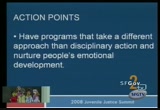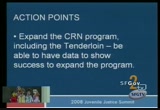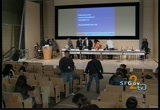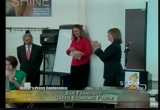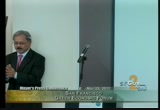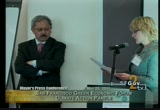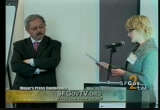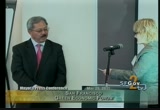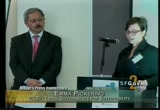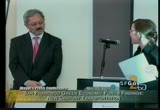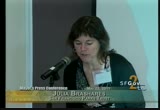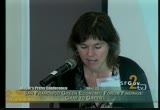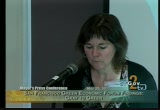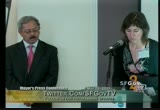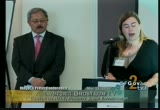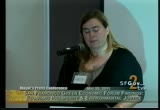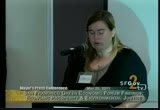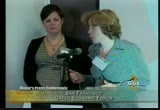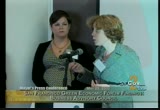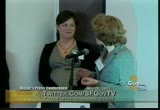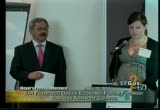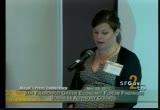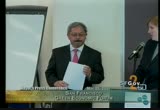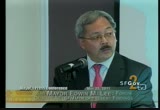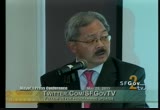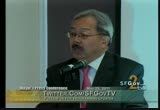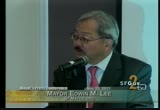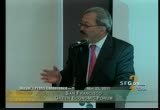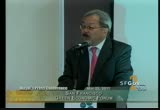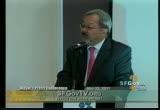tv [untitled] June 9, 2011 8:30am-9:00am PDT
8:30 am
and muni. >> have programs to nurture people's emotional development. >> need more coordination between cbo and other agencies for successful outcomes. >> currently, funding is insufficient of full implementation. >> have a speaking circuit much juvenile advocates to people at every school. >> ask if usd could come to library to speak about resources >> but services in neutral areas so they can be used by a variety of people >> expand collynn programs.
8:31 am
>> expand the crn program including into the tenderloin. be able to have data to show success of the program >> need more gun buy back programs >> need to have mentor ships and use those skills like science, technology, media and thearts. and all of these materials as well as these recommendations will be on our website. we want to thank everybody your your attendance. we thank the panelist also for reducing violence.
8:32 am
>> as you all know, the mayor is here to hear a little bit from the climate action panel that have been meeting. five of them will be presenting their findings today and then we will hear brief remarks from the mayor. so i did first want to welcome mayor lee and explain a little bit about the panels and how we'll be presenting the findings.
8:33 am
[applause] >> welcome, mayor lee. today we are pleased to present you with the recommendations of five community panels that have been working with me and the department of environment on the city's climate action plan. and these panels consist of businesses, community organizations, advocates and nonprofits. so they're going to come up and each one of them is going to introduce themselves, read you their short recommendations and hand it to you so that you can keep it in perpetuity. or keep it for reference the next time we come back asking for questions. the first one we have is energy independence. [applause]
8:34 am
>> my name is karrie, and i'm the managing director and a member of the energy independence advisory panel. and i'd like to read our findings to you. forgive me for reading from this, but i want to make sure i get it right. the city and county of san francisco recognizes that energy use in buildings is the single largest contributor to the city and county of san francisco's carbon footprints. therefore, the san francisco department of the environment has brought together two sets of stakeholders to advise the city on building with energy issues. the first is the renewable task
8:35 am
force. the second of which, we, the undersigned are members is the energy independence advisory pafpblet as advocacy organizations and businesses connected to the property, buildings and energy industries, we have focused on energy use, particularly natural gas use in buildings, and energy efficiency in green buildings. our main discussion was the need for discussion among stakeholders in the economy, academics, building scientists, tenants, policymakers, and property owners and managers. inceased access to the latest research and information about energy efficiency and green building and the financial benefits would boost the energy efficiency sector through more effective green and social marketing and the creation of a critical mass of awareness. we are committed to working with the city to foster this
8:36 am
type of communications. our recommendation is that the city establish a quarterly information exchange to be managed by the department of the environment. by collating requests from parties across the building sectors for relevant scientific data to support the marketing and implementation of energy efficiencies, then streamlining and submitting those requests to its academic partners on a quarterly basis and distributing the resulting data, the city could invigorate the industry and provide valuable tools for all its partners in the field. we look forward to our city's strong next steps on this front. sincerely, the energy independence advisory panel to the san francisco climate action strategy. myself, also, zakary brown, also the building owners and managers association of san francisco, chris chapel from sun water solar, and jonathan from whole systems consultants. thank you.
8:37 am
[applause] >> next up, we have emma pickering representing the transportation panel. [applause] >> hello, mayor lee. it's my pleasure to present the recommendations of the new century transportation advisory panel. our organization is concerned with the san francisco transportation sector. we are writing to express our support for the city and county of san francisco greenhouse gas emissions control and specifically for the transportation actcy's climate action strategy for the transportation sector. we recognize that the transportation sector is responsible for 30% of san
8:38 am
francisco's greenhouse gas emissions. it will be crucial for public transportation is prioritized. because human mobility is essential to our economy and to the life of every citizen, it will take organizations like ours working with the city to realize m.t.a.'s vision for the future transportation of san francisco, a safer, more efficient and lower carbon vision. we remain committed to advocacy, communication and developing existing and new businesses to support the transportation infrastructure of the 2 sst century. -- 21st century. i'd like to thank the other panelists. thank you.
8:39 am
[applause] >> next up, we have julia. [applause] >> good afternoon, mayor lee. i am very pleased to read the letter from the gray to green advisory panel. as organizations concerns that the climate will have on green infrastructure and as panelists on the greater green advisory panel to the san francisco climate action plan, we appreciated the opportunity to learn about the city's climate action strategy. we are writing to express r
8:40 am
support for the city and county of san francisco's greenhouse gas emissions reduction targets and to recommend that the city incorporate urban greening and green infrastructure into its larger climate planning efforts in regards to both greenhouse gas mitigation and adaptation to climate change. we have a number of specific recommendations, and they are guided by these principles. one, the city, when forming green-space management policies, should consider local ecosystem functioning and climate science, first of all. two, the city should work towards managing and investing in its green infrastructure with the same policy, vigor and performance expectations as it does its man-made infrastructure when addressing ecosystem functions for climate mitigation and adaptation.
8:41 am
and he three, when planning for urban green space, the city should support the activities of neighborhoods and community groups in their roles as local stewards of our green spaces. our specific recommendations as far as how the city should organize these efforts are, one, the mayor's office should coordinate an interdepartmental panel on green space policies in order to increase communication between city departments and identify synergies and land management practices and to establish a unified process for community greening of public parcels, and, two, when sfpuc efforts toward watershed-based planning include recommendations for green infrastructure improvements, all land-owning city agencies should collaborate on implementation of their findings and grants
8:42 am
distributed by city department of the environment should include requirements that the grantee spend granted money locally whenever possible. so we really look forward to the continued work with the city as we move together into a new era of integrated and eek logically-based urban and climate planning. so thank you. the greater green advisory panel includes myself and anna alvarez, the chair of the san francisco department of recreation and parks, karen kidwell at the san francisco parks, casey allen at s.f. landscapes. victoria bell, the neighborhood parks council, john bella at rebar, that's a big committee, the unified school district's schoolyard alliance, jeffrey boettcher at gardens
8:43 am
initiative, peter at nature in the city and dan flanagan at doug wildman at friends of the urban forest. thank you. [applause] >> thank you, two more to go. economic prosperity and environmental -- [applause] >> hello, mayor lee, thank you for being here very much. i'm with the center on race poverty and the environment. today i am representing the economic pros period of time jobs and environmental justice -- prosperity jobs and environmental justice program. the city and county of san francisco recognizes that poor neighborhoods have been burdened by the pollution generated by the fossil fuel-dependent economy and continues to suffer from high unemployment rates. as such, the san francisco
8:44 am
department of the environment climate program recently convened two meetings of the economic prosperity jobs and environmental justice panel to create policy structure and directives that support the growth of the new local green economy. members of this panel represented a community activists, nonprofit organizations and job-training programs dedicated to addressing the economic and environmental concerns of low-income residents from underserved marginalized communities. the economic prosperity jobs and environmental justice advisory panel supports the city's climate action planning efforts and recommends that the city formally link climate planning to social equity and job opportunities in the following ways -- i'm going to read an excerpt here. integrate social equity goals and environmental justice into the city sustainability and climate action planning efforts, include a public
8:45 am
participation process aimed to reach the communities most impacted by pollution and climate change. and for any planning and decision-making during implementation of the city's climate action strategy. continuing supporting and incentivizing businesses to go green, with a focus on san francisco's small local businesses with an eye toward their expansion and the resulting local job creation. and finally, leverage the city's climate planning actions to achieve health benefits in community addition proportionally impacted by toxic pollution. given the long-term and complex nature of climate planning policy and economic environmental justice issues in the city, we recommend the city create an independent panel to maintain accountability at city departments and others. this group would meet regularly over a multi-year time scale and report back on the city's progress integrating climate planning and environmental justice. the members of the advisory panel look forward to working
8:46 am
with the city and private sector employers in identifying further specific actions to promote green jobs in san francisco. on behalf of the panel, which includes myself, kevin daniher, laurie bernstein with goodwill industries, teresa, and elliott hoffman with true market solutions , inc. thank you. [applause] >> and last, but not least, we have our representatives from the business advisory panel, christina page with yahoo and melissa. [applause] >> good afternoon, mayor lee. we were asked to just comment very briefly before sending our
8:47 am
letter on the experience that companies had in the advisory panel. on behalf of yahoo, in addition to finding this dialogue both inspiring and thought provoking, it doesn't sound very reassuring because we discovered that the stea's climate action plan shares a lot of the beliefs that we have in constructing our corporate environmental strategy about how you attack this proper of climate change. the first is, how urgent is this problem? the action on climate change is not a good business strategy. inaction on this issue is going to be very costly to businesses and society. by taking a stand, by saying we're going to get to 25% reduction by 2017 on community greenhouse gas emissions, the city is recognizing the urgency of this problem. number two, i think we found that if you do this properly, you can save money, you can generate jobs, you can create new markets, contrary to a lot of popular beliefs and things you see in the press.
8:48 am
if you have a good energy efficiency program with great incentives, you see your utility bill shrinks and that goes to the company's bottom line. if you have good transit programs that reduce traffic congestion, that's good for employee productivity, because you have people not sitting in traffic on the way to work and not circling the block endlessly looking for parking, instead of getting to work. so that's good for us. number three, there's the cross-sector dialogue that we've been hearing all of the different panels really experience. i learned a lot from my colleagues in business that i'll take back to my own company and we were able to communicate to the city that we want to see more carrots than sticks. we'd like to see programs like if you get caught in the process of properly using the carpool lane, then you get registered automatically for a raffle ticket for a giants game, programs like that. although after the performance against the marlins, i'm not quite so sure about that. and last, but not least, we really are going to see good
8:49 am
public-private partnerships come out of this and that's where the real effectiveness is going to be. sharing both the costs and benefits to program and putting a lot of thought into the -çptem.lf we're reminded of the riddle of how do you eat an elephant? you eat an elephant one bite at a time. what the city has done and what s.f. environment has done is you've identified the elephant. you wrestle him into the room and then you invited us all to sit down and share our recipes. so we look forward to dialoguing with y'all. thank you. [applause] >> hi, mayor lee. my name is melissa. i'm the director of environmental affairs for gap , inc. as members of the san francisco business community, we're writing to express our support for the city and county of san francisco's greenhouse gas emissions reduction goal. as participants on the business advisory panel to the san
8:50 am
francisco climate action plan, the 12 businesses listed below appreciate the opportunity to learn more about climate change and to seek solutions that benefit all of us. we recognize that the commercial sector comprises approximately 40% of san francisco's greenhouse gas emissions and that as such, businesses play an important role in meeting our community's emission reduction target. excuse me, i'm pregnant and i can't catch my breath. business advisory panel members include small and large businesses across a range of sectors, including some who have committed to addressing their corporate carbon footprints. we believe that cross-sector efforts have a greater impact than acting alone. through organizations such as the business council on climate change, we seek to engage the city, counties and other businesses to assist the city and county of san francisco in meeting its greenhouse gas emissions reduction goal. we're eager to continue to work
8:51 am
with the city and county of san francisco to facilitate san francisco's strategy. bentley prince street. blue shield of california. cole hardware. gap inning, google, inc., hilton san francisco union square, the new resource bank, pacific gas & electric, wells fargo and yahoo inc. [applause] so on behalf of the department of environment i wanted to, first of all, thank our staff, who did a fantastic job of pulling together the panels as well as all of the advisory panel members. i know it was quite a time commitment over a number of months to have these discussions and make these recommendations, but we really truly appreciate your commitment and your time. now it is my pleasure and honor to introduce to all of you mayor ed lee, who's going to
8:52 am
make a few remarks. [applause] mayor lee: thank you. first of all, i think that elephants and sharks are probably not going to be on the cuisine this year. [laughter] but i am very happy to be here, and i wanted to, first of all, thank you for these papers. i do take this very seriously, as you know. i know that johanna, my climate visor to the mayor's office, and she's here today. we've had a number of discussions about how to update the climate action plan and where we're going, and this will go very far in guiding us and also in making sure that our plans can be updated properly. so i want to thank you for the work that's reflected in these papers, first of all, and to thank all of the efforts. here as i look across the room,
8:53 am
one of my thoughts as these presentations are made is, gosh, have we gone a long way. in the whole environmental movement i still remember those years where so many people were left out of the discussion, and that whole communities didn't know what their role would be yet, so you might have to suffer things and do things differently and not be properly guided, where were the jobs going to be or was it the environment versus our lives? all those contradictions had been so much a part of discussions that i had in my own community for many years, because we didn't have as inclusive of a process as i think these papers now reflect. so i want to give a shout out to all of you for your great efforts reflected in all of these and i want to thank melanie and her staff for the department of the environment for her guidance.
8:54 am
certainly rhonda simmons, you and the department of economic workforce development have been there because along with environmental policies, it's got to be job creation or job sustaining or the transitioning of jobs, and to be able to do that and present programs and retain jobs and change them consistent with the goals is as important. and then i also want to thank, of course, the center of environmental law here at the university for hosting this and making sure it happened promptly. as you know, i started out even as early as february by signing in to ordinance something that i thought was pretty dramatic change, and that is to work with our private sector in looking at the commercial buildings and seeing whether or not they could join in an effort to help us with our climate by reducing energy use.
8:55 am
and it was quite precedent setting in signing that ordinance. but also knowing that while we were requiring that private commercial buildings, existing commercial buildings begin, a process where they would actually calculate themselves, engage themselves along scientific points where the buildings could be measured about the energy use. as important as that ordinance is, what i thought was even more important is reflective of what here today is to bring in so many different disciplines of people, whether they're developers, building owners, architects, engineers, finance people, community folks, to bring them together even with that ordinance and to collaborate around how best that could be done. that collaboration is also and continues to be reflective of everything i do in this mayor's office and working with the
8:56 am
board of supervisors. even as of yesterday when we worked very closely with labor, and i know we have a lot of labor friends here as well, that we unveiled a pension plan. the big difference is we've done it in a way which includes everybody and gets everybody's viewpoint in and still has the job, still has the goal set out. and that's what i love about this city, because as we collaborate with all of the people here and get all the stakeholders and combine them with the expertise, we don't leave people out. that's so important to this city. it sometimes will be as important, if not more important, than the goal itself, because you can then obtain those goals. and i know that we're going to be able to make tremendous strides in reducing greenhouse gas emission ifs we include everybody and if we have a role for them to play. you can't leave out labor, you can't leave out community, you can't leave out experts. people cannot work in isolation, even though you may
8:57 am
have the best ideas going forward. you just can't do it in isolation. and so i will continue to push that. we are now at a very, very critical, but excellent time in, the city of san francisco. we are coming out of the recession. and as we are coming out and as all of you are concerned about everything from jobs to how we develop, we have choices to make, choices about how we will develop, what kinds of buildings that we want, what kind of energy savings, how far do we go, an are we ready to go further than we have before, and everything from green jobs, technology jobs, the buildings environments, our own san francisco environment. there's a lot of questions that are posed to me every single day, and we have an opportunity to advance further climate action improvements in everything that we do. and this is a great time,
8:58 am
because coming out of a very, very serious recession, there is opportunity also to include more people and to make sure that we evolve the kinds of jobs that we want, the green tech jobs that we know will be for generations in the future helping our environment. those have got to be signaled now. the training that is required, the education in all of our schools to train people for these jobs, so that they can respect science of our environment. that's what we've been trying to do here and letting the science tell us and guide us what we need to do to set the goals and nen making sure that we bring everybody along and make sure that we have all the institutions working in concert to do it. that to me makes a city wonderful like san francisco. and i'm so privileged to have all of you working together on this, because you do represent all of the things that i'm talking about, the things that have to come together to move things forward in the way in
8:59 am
which it includes everybody. so i want to thank you for these papers to signal to you that i will read them with great earnest and see immediately what we can do to adopt them into the city to manage the city. as you know, i've tried to create a foundation in which we have a budget, we have a pension and we have relationships with all of our different parts of the city to be able to look further forward. this is the first time i've introduced a five-year budget planning for the city, and that meant a completely different dialogue with people. some people said, you mean i don't have to struggle with you this year just whether or not we're going to survive, whether it's a community-based agency helping us with aids or another agency helping us with our environment? they didn't have to ask that, because we invited them in to say, let's talk about this year and let's talk about the next
79 Views
IN COLLECTIONS
SFGTV2: San Francisco Government Television Television Archive
Television Archive  Television Archive News Search Service
Television Archive News Search Service 
Uploaded by TV Archive on

 Live Music Archive
Live Music Archive Librivox Free Audio
Librivox Free Audio Metropolitan Museum
Metropolitan Museum Cleveland Museum of Art
Cleveland Museum of Art Internet Arcade
Internet Arcade Console Living Room
Console Living Room Books to Borrow
Books to Borrow Open Library
Open Library TV News
TV News Understanding 9/11
Understanding 9/11